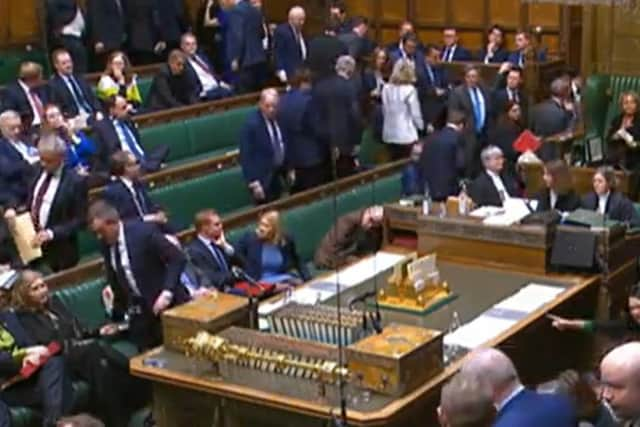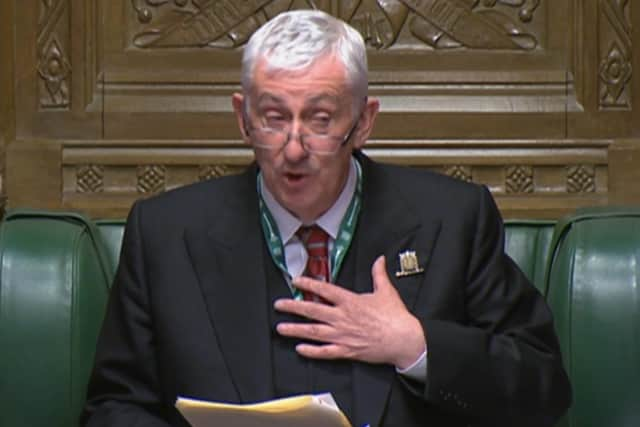Gaza ceasefire vote: Everything that happened in the House of Commons amid row amongst SNP, Labour and Conservative MPs
It was a debate that was supposed to be focused on calling for a ceasefire in Gaza and stopping any more innocent civilians from dying in the conflict.
Instead in an extraordinary few hours of politics, MPs ended arguing and shouting over parliamentary procedures. The Commons descended into chaos, with the SNP saying they have been treated with contempt, and calls for Speaker Sir Lindsay Hoyle to resign.
Advertisement
Hide AdAdvertisement
Hide AdSo how did we get here? We take a look at everything that happened during the debate on Wednesday night.


What was the debate about?
Wednesday was an opposition day debate, which meant the SNP was allowed to take control of the agenda in the House of Commons.
They chose to use this time to table a motion to call for an “immediate ceasefire” in Gaza. The Labour Party put forward an amendment to this, calling instead for an “immediate humanitarian ceasefire”.
The UK government also had an amendment for a “humanitarian pause” that “moves towards a permanent ceasefire”.


What was Labour going to do?
Had Labour’s amendment not been chosen to be heard, Labour MPs would have instead been forced to vote on the SNP motion.
Had this happened, party leader Sir Keir Starmer was expected to order his MPs to abstain from the vote.
Backbenchers warned him he could face a rebellion if he whipped them against voting in the debate, which could have resulted in the biggest rebellion Sir Keir had experienced since taking charge.
But what actually happened?
In a highly unusual move, Commons Speaker Sir Lindsay Hoyle decided to allow Labour’s amendment to be debated. This meant MPs ended up voting on Labour’s proposals, not the SNP’s amendment, who were in charge of the day’s proceedings.
Why did the Speaker do this?
Good question.
Advertisement
Hide AdAdvertisement
Hide AdThe Speaker was warned by clerks the move was unprecedented. He has now come under fire from both the government and the SNP, with accusations he was told he would be ousted by Labour if he did not pick their amendment. This allegation has been denied by both Sir Lindsay and Labour.
SNP Westminster leader Stephen Flynn said: “Every single member of Parliament knows that Lindsay Hoyle was meeting with Sir Keir Starmer and Alan Campbell, the Labour chief whip, before a decision was taken today.”
Mr Flynn said the Speaker’s position was now “intolerable”. SNP MP Pete Wishart said Sir Lindsay should now resign.
House of Commons Leader Penny Mordaunt claimed Sir Lindsay had “hijacked” the debate. Later in the debate MPs shouted “resign” at the Speaker.
How did MPs react to this?
Not well – the SNP in particularly angry at what happened.
Both Tory MPs and SNP MPs walked out of the Commons debating chamber in protest, although it is understood SNP MPs headed to the voting lobby afterwards. Because the Tory MPs walked out and didn’t vote, the Labour amendment passed.
What has the Speaker said?
After the anger simmered to a level where he could once again talk, the Speaker said he thought he was doing “the right thing and the best thing”. However, he said he regretted what he did and apologised.
Sir Lindsay said: “I regret how it’s ended up – it was not my intention. I wanted all to ensure they could express their views and all sides of the House could vote.
“As it was, in particular the SNP, were ultimately unable to vote on their proposition. That was never my intention for it to end like this.
Advertisement
Hide AdAdvertisement
Hide Ad“I was absolutely convinced that the decision was done with the right intentions. I recognise the strength of feeling of members on this issue.”
Is this good for Labour?
It certainly all worked out for them. Labour MPs got to vote on their own amendment rather than being forced to vote on the SNP’s motion.
It also means Sir Keir avoided a potentially embarrassing rebellion in his party.
What happens now?
Thirty MPs have signed a motion of no confidence in Sir Lindsay, calling on him to resign from his position. Sir Lindsay is due to hold talks with all party leaders today to try and work out a way forward.
Comments
Want to join the conversation? Please or to comment on this article.